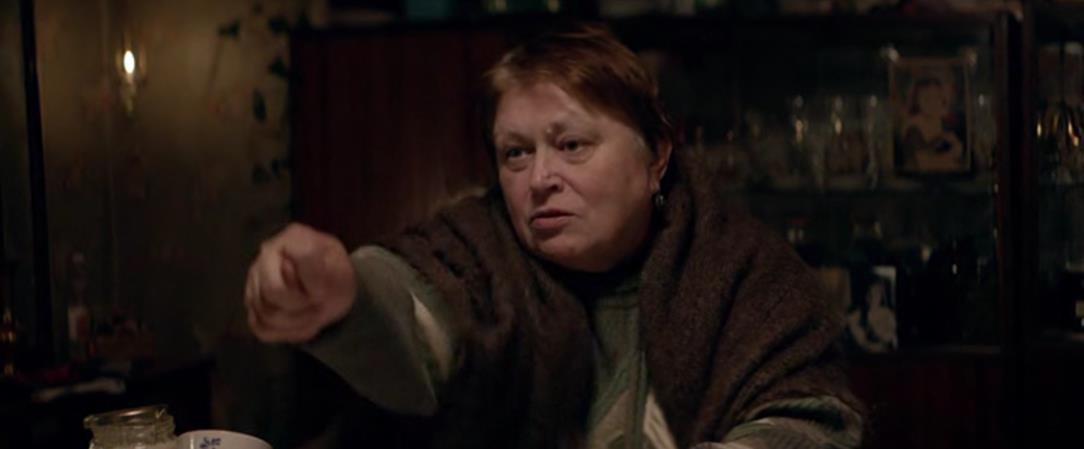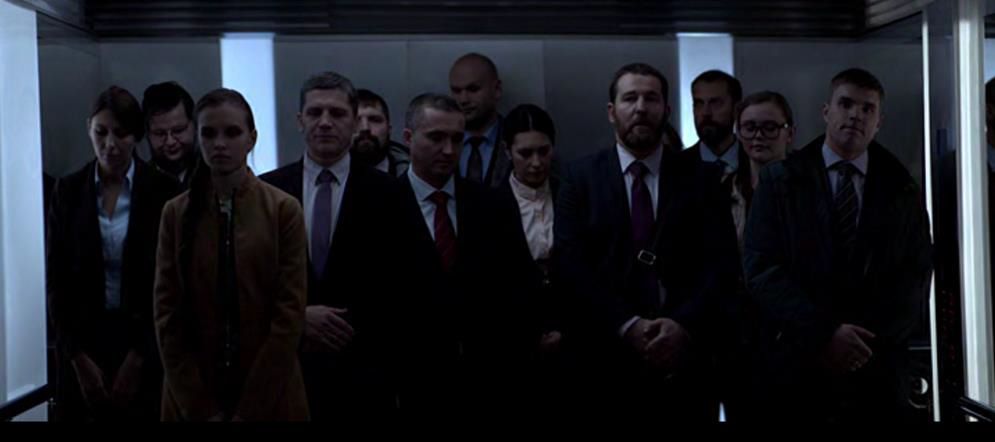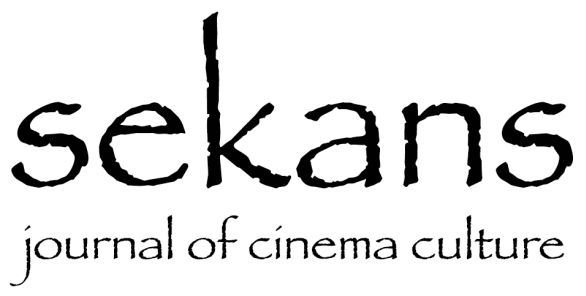DESAMOURUSSIA
Gökhan Erkılıç
Loveless (Nelyubov)
Director: Andrei Zvyagintsev
Scriptwriter: Oleg Negin & Andrei Zvyagintsev
Cinematographer: Mikhail Krichman
Music: Evgueni Galperine & Sacha Galperine
Editor: Anna Mass
Cast: Maryana Spivak (Zhenya), Aleksey Rozin (Boris), Matvey Novikov (Alyosha), Marina Vasileva (Masha), Andris Keiss (Anton), Aleksey Fateev (İvan)
2017 / 127’ / Russia - France - Germany - Belgium
Here are some questions asked for a long time, answers of which have been found:
Does the essence of what is called human being belong to nature, plastic, metal, or nothingness?
What reduces the status of being mother and father to the mission of mediating life?
How long have we been a captive of suffocating, blinding and chilling lovelessness which shrinks the habitats finally kills us?
![]()
Specific questions about Nelyubov:
Is the thing called life being hung on a branch of a tree, one standing by the shore of a lake under snow and hit by time?
What leads a child to be a loss with his anger burning inside in his silence?
What do the house we try to sell at once and our partner we try to get rid of through which, we suppose, we can get rid of the past mean for our personal belongings and for our shared past?

We build relationships by emotional and even by shallow decisions based on the concepts ‘attractive’ and ‘unattractive’ even though we do not know and sometimes cannot explain to ourselves what they are. Then, we attempt to exist and pretend to be able to exist in the rational arena.
While most of the life experiences consume the future, few re-establish the life. The lives bearing the burden of unforgivable mistakes become unbearable burdens on soul. Yet there is no need to discuss that the highest potential for making mistakes is when it is not the right time to make decisions.
For a long time, it has been a favourite intellectic subject matter that it is impossible to evaluate in terms of socio-economic classes because they are invisible. However, there is a fact even clearer than a crystal: You do not and cannot see if you don’t look. The gap between social classes is not only economic and cultural; but there is even a wider one our emotional and human existence. It is ironic to call our time “age of poverty”, too narrow to call it “age of technology”, so I believe it is more appropriate, comprehensive and realistic to call it “age of human deprivation and lovelessness”.

Zhenya is a very familiar character to come across often. Suffering from a hunger for love, she is unabashed about love. She pretends to be only thinking about love and knows how to ask for limitless love, although she cannot give any love to Alyosha for not having it in herself. She is in the delusion of exchanging desire with love. Zhenya is a typical phone-addict as if it was her mate which has become an organ completing her or as if she can complete herself by it. It is one of her two organs she uses, that is, she is capable of using. She can only say “I guess” to the questions asked about her son Alyosha’s daily life, tendencies and habits. Well, does anyone called Zhenya exist? I guess not.
Boris is a loose cannon, giving an impression of having dual cores. He is not on the side of the “I guess” people. He is one of those who are smaller than they are, but believes he is a bigger person than he is. You can come across him at any hour, and question what sin you have committed to end up with him in the same place.
The blonde captive Masha is an artefact, as a heroine from the Slavic romanticism living among us. As if fallen from the previous century, a breeze from the nucleus Russia!
And the Grandmother... Mother Russia must have gone crazy. The steppe crochet stitched from left to right by Great Katarina echoes throughout the cities. As a past habit we know that Moscow Does Not Believe in Tears, but it is obvious there is no single place overtaken and covered by disbelief.
There is also the state with its cast on the stage. They have a limited role of claiming that the civil search and rescue squad is faster and more efficient than the police. The reason for their existence is to declare their absence.
There is nothing to say about the casting choice of Zvyagintsev, it is magnificent as always. However, this time all are typecast, so much that we might bump into them at any time on the coasts of Anatolia: Hail our creation, the Homo AI. (This should not be read as All-Inclusive, what I mean is “Ain’t Inclusive at all!”).

Radio and TV were the media for communication in the last decade, now they are used much more; however, they are no longer the means for communication but the decorative stuff as accidents of communication. Although it is a combined device, what we call mobile phone today replaces them all. A new type of human who is visible everywhere for a long time is badly intimate with this thing: We come across this type of being with the cables sprung from its head, and its absurdities include posing as if attached to a reanimator machine or sometimes falling flat on the face or gets under a car. I suppose this type of being live on fastened to the phone via cables, and it is occasionally possible to consider it as a part of the mobile phone. Isn’t it possible to interpret the invasion of this very specific species with its asocial reactions beyond human’s surrender to the infinite void of man's inner world but as an expression of the age of lovelessness?

I have an objection to those who take the film as an excuse to judge the Russians. Obliged to work to repay their loans caused by the dictated unnecessary needs, their faces driven by the fear of dismissal at any time, wasting a quarter of their lifetime in the shopping malls, addiction to technology, acting the smartest by fooling others, their creativity capable of making jokes that can only be the signs of underdevelopment, surviving by eating one another up, lacking any passion, desire, interest, aim, dream or hobby, their sneaky faces veiling their destructive anger… The humans of this age have all these in common. Even though the film is set in a story of a group of Russian-speakers among the global human, it tells about the global human whose most obvious indexical sign is lovelessness.
The biggest contribution of the film might be creating an arena for thinking and discussing on lovelessness. Lovelessness is a condition preventing the individual from being qualified, original and creative, and it is a power destroying the desire for life, which swirls human into the monotype. Any domain ruled by lovelessness bears the disbelief and soon brings forth anxiety, arrogance, hatred and violence.

Cinema can turn into an existential activity and a protest against lovelesness in the hands of a director kneaded with love. Nevertheless, after all, the directors of our age are not extra-terrestrial creatures either, and they do take their share of the devastating effects of this loveless age. This century is such an age in which economics and politics steal one another’s role and get integrated in global models, a place where human values are put aside and disgraceful ignorant leaders show off, rights and justice are swapped with stealing and violence, vulgarity is praised, the laborless profit is sanctified, making everything that is conceivable seem as though they can be bought by money and where the human is diminished to the cheapest object. The human whose existence is lost in such an era does not write poems or sing, or contact culture or reach out for art. The schizoid, depressive and paranoiac society loses its social ideals and aims. For this reason, what is lost in Nelyubov is not only the little Alyosha but also the future- our future.
Lovelessness is a global disease.

Where does the problem of Nelyubov lie? What originates our feeling of ‘unripeness’? It partly lies in the unbearable weight of repetitions, the scenes which could be cut to make the film tidier but instead kept despite the lack of their saying something new, the unnecessarily long scenes, the mis-en-scenes with the same meaning, the warped spine of the narrative caused by the unbalanced distribution of weight, stammering while trying to say many things, the dialogues which make the audience sometimes yawn, the unbalance resulted from the so-so quality of the scenes as exposed by some good ones, the narrowness evoked by the narrative which is loose for the theme, being fallen into prey of prosiness while telling about prosiness.
If it has so many flaws, how come the awards teem? I would like to point out the fact that most of the awards are from the lower ranked festivals. None of the best film awards won is from an A-class festival. The important awards were given to the cinematographer. We must not forget the European production partners might have used their authority in the sector and that the director's name has some brand value. In addition, the fact that the film had more nominations than awards points out a problem: The judges did not find the film worthy and mature enough for the win. When there are lots of examples of this “unripeness”, there is no need to discuss on this issue further.
Is the director's sudden let-down unexpected? Since I expected this after the films Elena (2011) and Leviathan (2014), I was not surprised. The films Vozvrashcheniye (2003) and especially Izgnanie (2007), where the director kept the bar so high, were effective as well in this result. If we consider lovelessness as a theme, we must say that both films were more successful in portraying and conveying it.
It is hard for me to believe that I have just watched a film whose director said he was inspired by Antonioni, Bergman, Dostoevsky, Tarkovsky as far as I can remember from his interviews. Zvyagintsev depletes his stocks with an attitude often encountered in the history of cinema.
I wonder if Zvyagintsev were given a chance to erase one film from his filmography, would he choose any other of his films? Or would he go back before 2017?
Another ruthlessly self-imposed question: If given a chance, where would Zvyagintsev shoot his ‘Hatred’ film?

A film on the dark side of the moon that remains in the dark side of the moon, Nelyubov.
Published in SEKANS Sinema Kültürü Dergisi, April 2018, Issue e7, pp. 19-24
Translated by Gülşan Maden, Nurten Bayraktar
This email address is being protected from spambots. You need JavaScript enabled to view it., This email address is being protected from spambots. You need JavaScript enabled to view it.
